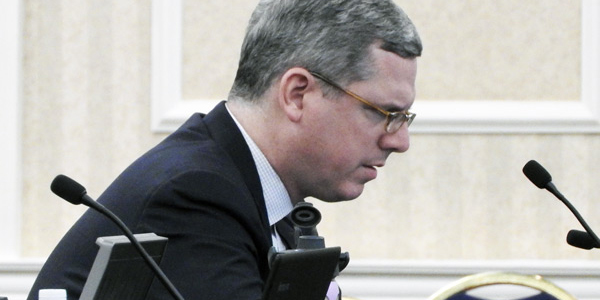PJM stakeholders continued their talks last week over integrating carbon pricing while focusing on the impacts of states looking to join regional environmental collectives like the Regional Greenhouse Gas Initiative.
Jen Tribulski of PJM led a discussion of stakeholders’ interests during the June 30 Carbon Pricing Senior Task Force meeting.

Neal Fitch, NRG Energy | © RTO Insider
Neal Fitch of NRG Energy gave a presentation noting that carbon pricing is being expressed in direct programs through states that have already joined RGGI and also indirectly through renewable portfolio standards and zero-emission credits (ZECs). Fitch said the indirect carbon pricing programs involve a “fairly significant amount of money” that needs to be addressed, including $4.4 billion in total RPS costs from 2014 to 2018 compared to $1.4 billion raised in RGGI auctions over the same time period.
Fitch said PJM must ensure it considers all programs at the state level that are driving carbon costs while addressing the possibility of direct carbon pricing in the RTO. He said NRG would like to see debates on ways PJM could utilize existing state programs to transform them into a vehicle to achieve carbon-reduction goals at a lower cost through greater efficiency.
“We don’t want to lose sight that there are a lot of levers already in play regarding carbon pricing,” Fitch said.
Border adjustments and leakage have been some of the most hotly debated issues regarding carbon pricing. (See PJM Panel Weighs Impact of Pa., Va. Joining RGGI.) But Fitch said as more states decide to adopt carbon pricing, border adjustments become less of an issue because they are “remedied as states migrate toward a consensus position on carbon regulation.”
“As the progress and expansion of carbon regulation goes beyond one or two states, the need to address leakage and border adjustments remedies itself,” Fitch said.

Jason Barker, Exelon | © RTO Insider
Jason Barker of Exelon asked Fitch if NRG is asking that the task force not address border adjustments or leakage in future discussions.
Fitch said border adjustments and leakage remain “something to contemplate” and that he would want them fully addressed and vetted before moving too far ahead. He said stakeholders who find border adjustments to be a “constraint” when discussing carbon pricing may be more comfortable with carbon pricing as the borders go away with more states adopting environmental standards.

Michael Borgatti, Gabel Associates | © RTO Insider
Barker said one of the interests Exelon has for the task force is seeing how stakeholders can both enhance the value of the carbon programs states are undertaking while also recognizing time is an element in the discussions. Barker said Exelon doesn’t want to lose sight of what can be accomplished in the short term while pursuing broader solutions over the longer term.
“There have been decades of talk about carbon pricing, and it hasn’t happened other than in a state-by-state basis,” Barker said.
Michael Borgatti of Gabel Associates spoke on behalf of the American Wind Energy Association, the Solar Energy Industries Association and 27 other organizations who were signatories of a letter sent to the PJM Board of Managers on June 26 calling for continued discussions on carbon pricing.



